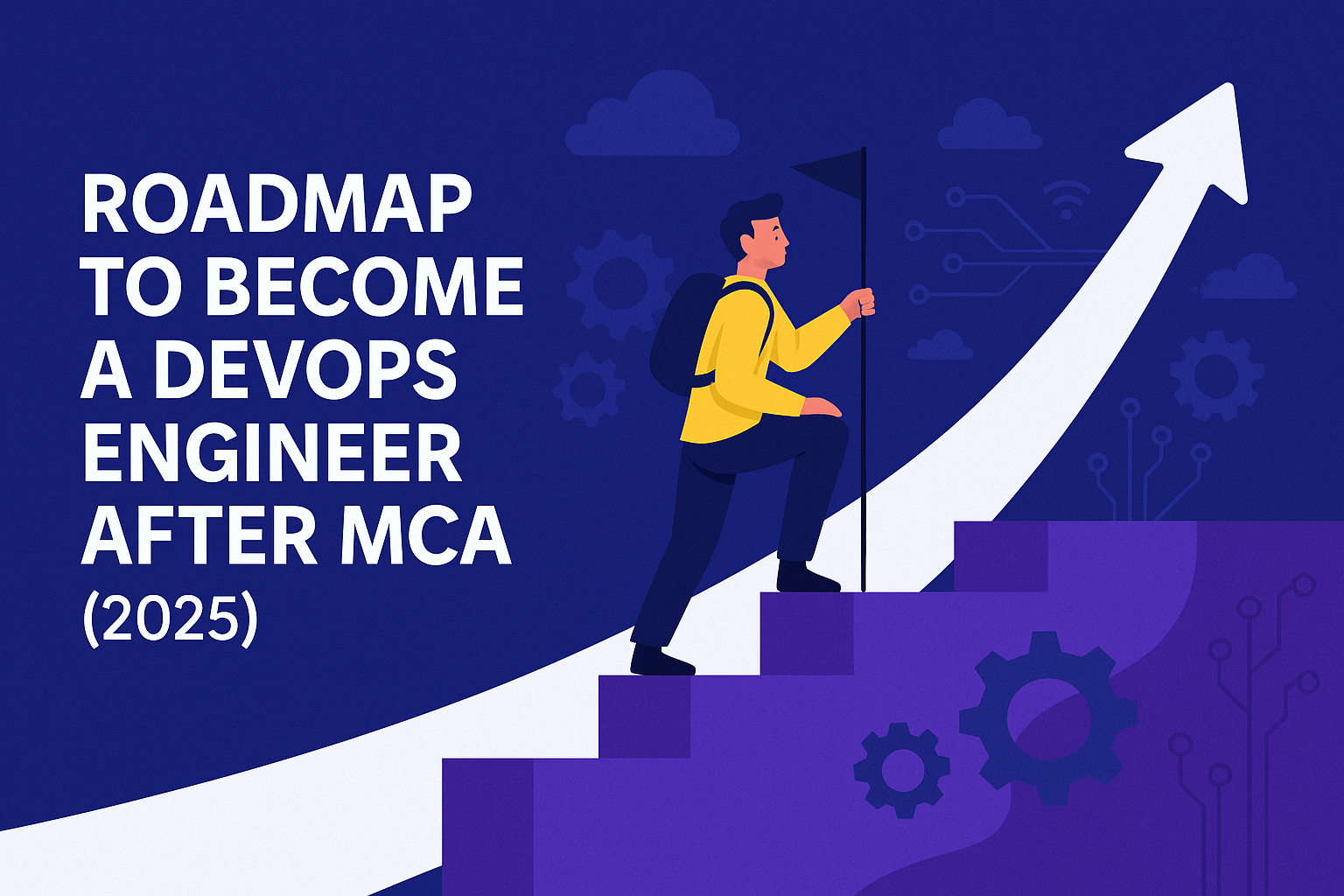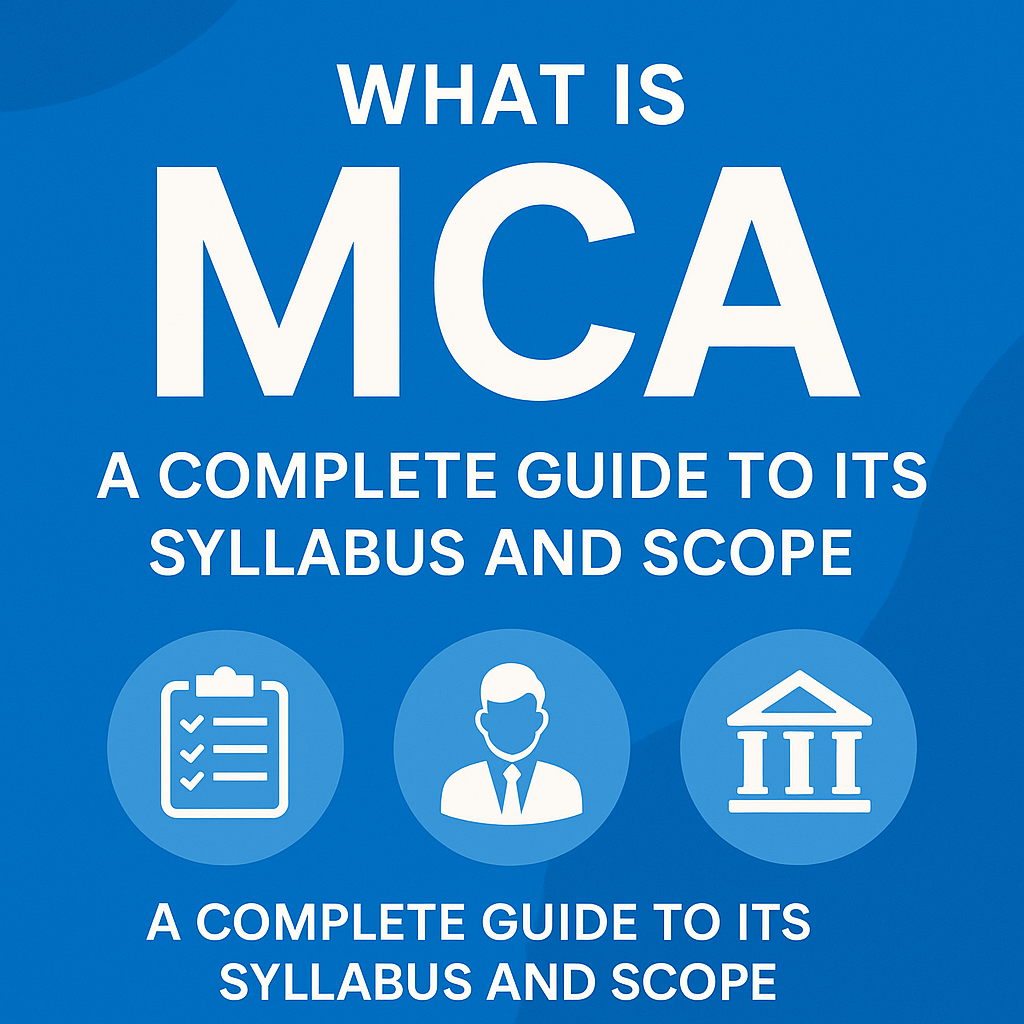You can become a DevOps engineer after MCA in 2025, both in India and abroad. An MCA gives you strong knowledge in software development and IT operations. If you choose a DevOps or Cloud specialization, you build an even stronger foundation. Companies such as Zoho, TCS, and Infosys offer salaries from ₹10 LPA to ₹28 LPA for these roles.
| Aspect | Details |
|---|---|
| Average Salary | ₹10 LPA – ₹28 LPA in India |
| Top Employers | Zoho, TCS, Infosys, Capgemini, Mindtree |
| Required Skills | Jenkins, Docker, Kubernetes, Linux, Bash Scripting, CI/CD, Infrastructure as Code |
| Suggested Certifications | AWS Certified DevOps Engineer, Docker & Kubernetes Specialization |
If you build technical skills, earn certifications, and gain hands-on experience, you set yourself up for a rewarding career.
Key Takeaways
- An MCA degree provides a strong foundation in programming, IT operations, and management, making it a great start for a DevOps career.
- Master key DevOps skills like Linux, scripting, cloud platforms, automation tools, and communication to succeed in this field.
- Earning certifications such as AWS DevOps Engineer and Kubernetes Administrator boosts your job prospects and salary potential.
- Build a strong portfolio with real projects and open-source contributions to showcase your skills to employers.
- DevOps roles offer high demand and good salaries in India and abroad, with growth opportunities for those who keep learning and adapting.
DevOps Engineer After MCA
Why MCA Is a Good Fit
You gain a strong foundation for a DevOps career when you complete an MCA. The program covers many technical subjects that are important for a DevOps engineer after MCA.
- You learn programming languages such as Java, Python, and .NET Framework.
- You study operating systems, database management, and computer networks.
- And you explore cloud computing, machine learning, and distributed systems.
- You develop management, project leadership, and communication skills.
- You get hands-on experience through practical labs and projects.
This multidisciplinary approach prepares you for both software development and IT operations. You also build teamwork and problem-solving skills. Many MCA programs list DevOps as a direct career path. This shows that your degree matches the needs of the industry.
Tip: Employers value candidates who understand both technical and business aspects. Your MCA helps you stand out in interviews for DevOps roles.
DevOps Specializations in MCA
Many universities now offer specializations in DevOps or Cloud Computing within the MCA program. These specialized courses give you deeper knowledge and a competitive edge.
- You focus on full-stack development and learn how to streamline deployment processes.
- You prepare for roles like Full Stack Developer and DevOps engineer after MCA.
- Also you meet the high demand for DevOps specialists, especially in startups and SaaS companies.
- You master skills that match the latest trends in the IT industry.
- You can choose a specialization that fits your interests and career goals, which can boost your earning potential.
Specializing in DevOps during your MCA helps you gain the exact skills employers want. This makes your transition into a DevOps role smoother and more successful.
Essential DevOps Skills

Technical Skills Needed
You need a strong set of technical skills to succeed as a DevOps engineer after MCA. Employers look for candidates who can manage both development and operations tasks. You must understand how to automate processes, manage infrastructure, and work with different teams.
| Skill Category | Description & Importance | Key Topics to Learn |
|---|---|---|
| Linux Fundamentals | Manage servers, automate tasks, and troubleshoot issues in real-world environments. | Basic Linux commands, shell scripting, package management (yum, apt) |
| Programming & Scripting | Automate tasks and build deployment pipelines. | Python, Bash scripting, Ruby (optional) |
| Version Control Systems (Git) | Track code changes and collaborate with teams. | Git basics, branching, merging, pull requests |
| Configuration Management | Ensure consistent server and infrastructure setup. | Ansible, Chef, Puppet, configuration files, variables |
| Infrastructure as Code (IaC) | Automate infrastructure management for consistency and version control. | Terraform, reusable modules |
| API Integration & Automation | Connect applications and automate API tasks. | REST APIs, Postman, scripting for APIs |
| Cloud Computing Platforms | Deploy and manage scalable infrastructure. | AWS, Azure, GCP concepts, cloud DevOps tools |
| Security & Compliance | Protect deployments and follow industry standards. | Secure coding, infrastructure security, compliance standards |
| Computer Networking | Troubleshoot and configure network resources. | IP addressing, protocols, firewalls, network topologies |
| Testing & Quality Assurance | Integrate automated testing into CI/CD pipelines. | Unit testing, integration testing, Selenium, JUnit |
| Communication & Collaboration | Work with development, operations, and security teams. | Clear communication, technical writing, teamwork skills |
| Problem-Solving & Critical Thinking | Solve complex issues and improve processes. | Analytical thinking, root cause analysis |
| Agile Methodologies | Support rapid development and operational strategies. | Scrum, Kanban, Lean principles |
| Organizational Skills | Manage tools, scripts, and infrastructure efficiently. | Task prioritization, process management |
You must master Linux, networking, scripting, and automation. These skills help you automate repetitive tasks, manage secure infrastructure, and improve efficiency. Most DevOps roles require you to write scripts in Bash or Python. You also need to understand how to use configuration management tools like Ansible or Puppet. Employers expect you to know how to set up and manage cloud platforms such as AWS or Azure. You should also learn about Infrastructure as Code (IaC) using tools like Terraform.
Note: Companies value DevOps engineers who can communicate clearly and solve problems quickly. You must work well with both technical and non-technical teams.
Tools and Technologies
You must become familiar with the most popular DevOps tools and technologies. These tools help you automate, monitor, and manage the entire software delivery process.
- Linux: The backbone of most servers and cloud platforms. You use Linux commands and shell scripting for automation.
- Git: The standard for version control. You track code changes, collaborate with teams, and manage project versions.
- Jenkins: A leading CI/CD tool. You automate building, testing, and deploying applications.
- Docker: The most widely used containerization tool. You package applications and their dependencies for consistent deployment.
- Kubernetes: The top orchestration platform. You manage, scale, and automate containerized applications.
- Ansible, Chef, Puppet: Configuration management tools. You automate server setup and ensure consistency.
- Terraform: The main Infrastructure as Code tool. You define and manage infrastructure using code.
- AWS, Azure, GCP: The top cloud platforms. You deploy and manage scalable infrastructure and services.
- Monitoring Tools: Prometheus, Grafana, Nagios. You track system health and performance.
- Security Tools: You use tools for vulnerability scanning, compliance checks, and secure deployments.
Tip: Tools like Docker, Kubernetes, and Jenkins are in high demand. Companies in finance, tech, and SaaS rely on these tools for automation, repeatability, and faster deployments. Mastering them gives you a strong advantage in the job market.
You also need to understand how to measure and improve DevOps processes. Metrics such as deployment frequency, lead time for changes, and time to restore service help you track the effectiveness of your CI/CD pipelines. Tools like Jenkins and Git automate these processes and provide valuable data for continuous improvement.
Learning Resources
You can build your DevOps skills using a mix of online courses, documentation, and hands-on practice. Many professionals use these resources to stay updated and master new tools.
- Online Courses: Platforms like Coursera, Udemy, and edX offer courses on Linux, cloud computing, CI/CD, and containerization.
- Official Documentation: Always refer to the official docs for tools like Docker, Kubernetes, Jenkins, and Terraform. These guides provide the most accurate and up-to-date information.
- GitHub: Explore open-source projects and contribute to real-world DevOps repositories. This helps you gain practical experience and showcase your skills.
- Community Forums: Stack Overflow, DevOps Stack Exchange, and Reddit have active communities where you can ask questions and learn from experts.
- Books: Titles like “The Phoenix Project,” “The DevOps Handbook,” and “Site Reliability Engineering” offer deep insights into DevOps culture and practices.
- Practice Labs: Websites like Katacoda, Play with Docker, and AWS Free Tier let you experiment with tools in a safe environment.
Note: Surveys show that most DevOps professionals find official documentation and community forums more helpful than organizational training. You should focus on hands-on learning and stay active in the DevOps community to keep your skills sharp.
You can also join local or online DevOps meetups and webinars. These events help you network with other professionals and learn about the latest trends. By using these resources, you build a strong foundation and stay ahead in your DevOps career.
Certifications and Training
Top DevOps Certifications
You can boost your DevOps career by earning industry-recognized certifications. These certifications show employers that you have the right skills and knowledge. Many companies look for certified professionals when hiring for DevOps roles.
Some of the most respected DevOps certifications include:
- AWS Certified DevOps Engineer – Professional: This certification proves your ability to manage and automate AWS environments.
- Microsoft Certified: DevOps Engineer Expert: You learn to combine people, processes, and technologies on Azure.
- Google Professional DevOps Engineer: This certification focuses on Google Cloud Platform and site reliability engineering.
- Docker Certified Associate: You show your skills in containerization and Docker best practices.
- Certified Kubernetes Administrator (CKA): You demonstrate your expertise in managing Kubernetes clusters.
- HashiCorp Certified: Terraform Associate: You prove your knowledge of Infrastructure as Code using Terraform.
Tip: Choose certifications that match your career goals and the tools you want to master. Many employers value hands-on skills as much as certificates.
Certification Value in India and Abroad
DevOps certifications can lead to higher salaries and better job opportunities. Employers in India and abroad often pay more to certified professionals. You can see the impact of certifications on salaries and career growth in the following data:
- Many US DevOps engineers earn an average of $105,000 per year.
- In San Francisco, salaries can reach up to $146,000.
- 80% of companies pay more than $90,000 as a starting salary.
- 35% offer at least $115,000.
- 17% pay more than $125,000.
- Entry-level DevOps engineers in India earn about ₹3.65 lakhs per year.
| Experience Level / Role | Global Salary (USD) | India Salary (INR Lakhs) |
|---|---|---|
| Entry-level (1+ years) | $81,000 | ₹3.65 lakhs |
| Mid-level (3-5 years) | $110,000 – $130,000 | N/A |
| Seasoned (7+ years) | Up to $149,000 | N/A |
| Senior DevOps Engineer | N/A | ₹18 lakhs |
| Lead DevOps Engineer | N/A | ₹22 lakhs |
You can see that DevOps certifications and skills help you earn more as you gain experience. Companies in India and abroad reward certified professionals with better roles and higher pay. If you invest in the right training, you open doors to global opportunities and long-term career growth.
Building Your Portfolio

Projects and GitHub
You need a strong portfolio to stand out as a DevOps engineer after MCA. Employers want to see real-world projects that show your technical skills and problem-solving abilities. When you build and share your projects on GitHub, you give recruiters a clear view of your abilities.
- Hands-on project experience is critical, with 88% of employers considering it essential when hiring.
- Practical projects provide proof of your skills and improve your job prospects in a competitive market.
- Building a portfolio with examples of continuous integration pipelines demonstrates your testing skills to potential employers.
- Highlighting projects that improved deployment success or code quality makes your resume stand out.
A well-maintained GitHub profile acts as your digital portfolio. Recruiters use it to check your coding skills, creativity, and commitment to learning. They look for clear documentation, code quality, and how you solve problems. For junior DevOps engineers, a strong GitHub profile can show your initiative and passion for technology.
| Metric / Case Study | Description | Impact / Use Case |
|---|---|---|
| Deployment Frequency | How often you deploy software | Shows your ability to automate and deliver fast |
| Cycle Time | Time spent in each development phase | Helps improve workflow efficiency |
| Pull Request Review Ratio | Ratio of reviewed pull requests | Reflects teamwork and collaboration |
| Bugs by Severity | Categorizes bugs by impact | Shows your focus on code quality |
Tip: Use your GitHub to document your projects, write clear READMEs, and show your progress over time. This helps hiring managers see your growth and dedication.
Open Source Contributions
You can boost your portfolio by contributing to open-source projects. This shows you can work with others, solve real problems, and learn from the community.
- Contributions to open-source projects and writing technical blogs showcase your expertise and engagement.
- Active participation in platforms like GitHub helps you build a professional network and gain recognition.
- Networking is vital, as research shows 85% of jobs are filled through networking.
- Developing interpersonal skills improves collaboration and increases your employability.
When you contribute to open-source, you learn best practices and get feedback from experienced developers. You also show employers that you care about teamwork and continuous improvement. Even small contributions, like fixing bugs or improving documentation, can make a big difference in your portfolio.
Note: Open-source work not only builds your skills but also connects you with industry professionals. This can lead to job referrals and new opportunities in DevOps.
Job Search and Career Growth
Resume Tips for DevOps Engineer After MCA
You need a strong resume to get noticed as a DevOps engineer after MCA. Start by grouping your skills into clear categories like Cloud Technologies, Programming Languages, DevOps Tools, and Monitoring Tools. Aim for 3-5 categories with 3-6 skills each. Use keywords from job postings to pass Applicant Tracking Systems (ATS). Show your impact with numbers, such as reducing deployment times by 50% or increasing system stability by 35%. List your certifications, such as AWS Certified DevOps Engineer or Kubernetes Administrator, to prove your expertise. Highlight hands-on projects, especially those involving cloud or Kubernetes. Remove outdated skills to keep your resume focused.
| Strategy Aspect | Market Research Insight / Data | Relevance to MCA Graduates in DevOps |
|---|---|---|
| Skill Categorization | 3-5 categories, 3-6 skills each | Clear and comprehensive presentation |
| Tailoring to Job Description | Use keywords from job postings | Optimized for ATS and hiring managers |
| Quantifying Skills | Use metrics and examples | Shows measurable achievements |
| Highlighting Certifications | List relevant certifications | Validates technical qualifications |
| Showcasing Relevant Projects | Emphasize hands-on DevOps projects | Demonstrates practical experience |
Tip: Use resume scoring tools like Resume Worded to get instant feedback and improve your resume.
Interview Preparation
Prepare for interviews by practicing both technical and behavioral questions. Review topics like CI/CD pipelines, containerization, and cloud platforms. Practice explaining your projects and the impact you made. Many companies want to see how you solve problems and work with teams. Mock interviews and coding challenges help you build confidence. Stay updated on trends like AI-driven automation and Infrastructure as Code, as these often come up in interviews.
- DevOps roles are among the top three most in-demand tech jobs worldwide.
- Companies value hands-on experience and real-world project examples.
- Certifications in AWS and Kubernetes give you a competitive edge.
Opportunities in India and Abroad
You will find strong demand for DevOps engineer after MCA roles in both India and international markets. In India, DevOps engineers earn more than cloud engineers, with salaries ranging from ₹4.1 to ₹12.2 lakhs per year. Senior roles can reach up to ₹30 lakhs, especially in major tech hubs or multinational companies. Internationally, entry-level DevOps engineers start at about $85,000, with senior professionals earning over $130,000. Many companies offer remote or hybrid work, giving you flexibility. Career growth depends on your skills, certifications, and ability to adapt to new technologies. Companies reward continuous learning and leadership with higher pay and better roles.
You can become a successful DevOps engineer after MCA by focusing on practical skills, certifications, and real-world projects. MCA programs now include agile, DevOps, and project management, helping you match industry needs. Many organizations value continuous learning, with 44% of IT leaders promoting upskilling for DevOps roles. Certifications and hands-on experience open doors to high-paying jobs worldwide. Stay curious, keep learning, and use your MCA background to thrive in this fast-growing field.
FAQ
What is the best way to start learning DevOps after MCA?
You should begin with Linux basics and scripting. Next, learn Git, Docker, and Jenkins. Practice by building small projects. Use online courses and official documentation for guidance.
Do I need coding skills for a DevOps career?
Yes, you need basic coding skills. You often write scripts in Bash or Python. Coding helps you automate tasks and solve problems faster.
How long does it take to become a DevOps engineer after MCA?
Most people need 6–12 months to learn core skills and tools. You can speed up your progress by practicing daily and working on real projects.
Can I get a DevOps job abroad after MCA from India?
Yes, you can. Many companies hire skilled DevOps engineers from India. You need strong technical skills, certifications, and a good portfolio to compete globally.




Pingback: Cloud Computing for MCA: Why It’s a Must-Learn Skill in 2025